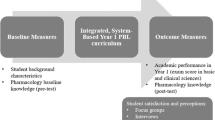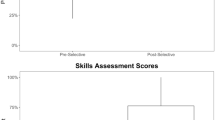Abstract.
In the Faculty of Health Sciences at McMaster University, the traditional discipline-based boundaries dividing the teaching and learning of basic medical sciences, such as physiology and pharmacology, do not exist. For more than 3 decades, student-centered, self-directed problem-based learning (PBL) has been the main form of instruction for students learning pharmacology within the medical curriculum and the pharmacological issues are always embedded within a health-care problem, with consideration of many other relevant non-pharmacological issues. In PBL, pedagogic emphasis is placed on the process of learning via constructive inquiry rather than cumulative acquisition of factual knowledge. For the science students, typically in the Biology/Pharmacology cooperative courses, both student-centered learning and teacher-centered teaching approaches are being used. In this case, the PBL approach is adopted to complement the conventional lectures at the course level. For medical students, PBL continues to be the major form of instruction in a small-group tutorial setting at the curricular level. The PBL curriculum is integrated across organ systems (cardiovascular, renal, respiratory, gastrointestinal, neural, etc) and across the life cycle, spanning population- and behavior-related perspectives, rather than being recreated from discrete disciplinary areas (such as physiology, anatomy, biochemistry, pharmacology, and community medicine). Those students who lack a pharmacology background or wish to enhance their pharmacological knowledge can take a block elective or horizontal elective in pharmacology. Unlike science students, medical students need to sort out pharmacological principles from the overload of information, to integrate them into the clinically relevant situations, and to ultimately apply them to the management of patients' illness. This is most effectively achieved in a student-centered environment conducive to life-long learning.
Similar content being viewed by others
Author information
Authors and Affiliations
Additional information
Electronic Publication
Rights and permissions
About this article
Cite this article
Kwan, CY. Problem-based learning and teaching of medical pharmacology. Naunyn-Schmiedeberg's Arch Pharmacol 366, 10–17 (2002). https://doi.org/10.1007/s00210-002-0561-y
Accepted:
Issue Date:
DOI: https://doi.org/10.1007/s00210-002-0561-y




